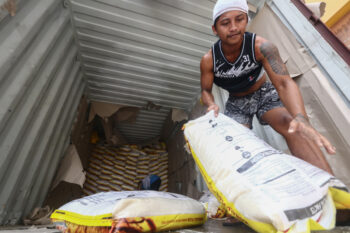GENERAL SANTOS CITY (MindaNews/2 November) – At 7:45 p.m. last October 30, President Bengino S. Aquino III, addressed the nation on ANC (ABS-CBN News Channel) of the ABS-CBN Television. In his 12-minute prime time address, he defended his administration against implication in the PDAF (Priority Development Assistance Fund) scandal and he clarified the integrity of the DAP (Disbursement Acceleration Program). The address was a rehash of his past statements in speeches and press interviews reported in the national media.
The Palace reported that 75 percent of the responses were in favor of the President’s address. Those were from televiewers who were satisfied by the President’s explanations and from those who would believe whatever the President says. From another view, the 75 percent represented the popularity the President still enjoys as seen by the Palace.
What about the other 25 percent of the responses? These may be classified into: (A) those who would damn the President in whatever he says or does; (B) those who see the issues of the problem objectively – independently of the personalities of those involved in the controversies. It is the responses of the B-Part of the 25 percent that the President must heed.
Most probably, the President and the Palace will be lulled by the “75 percent”; will be infuriated by the A-Part and will evade the B-Part of the “25 percent”. Should that be the reality, “God have Mercy on the Philippines!”
In debates, there are two categories of issues – the “admitted” and the “vital”. The admitted issues are no longer debated; only the vital are. The President dwelt so much on the admitted to focus the good image of his administration but missed the vital on which his image and that of his administration truly hang.
In opening his address, the President referred to the confusing “usaping (topic) Pork Barrel at DAP” and he proposed to clarify the controversies (liwanagin ang mga isyung ito). He saw stealing (pagnanakaw) as the center or root of the controversies. He identified the parties in the controversies – on one side, his administration committed to reforms, to the prosecution of the corrupt and to the uplift the poor; on the other, the corrupt (mga tiwaling) officials involved in the pork barrel scam.
He was combative. What got his ire, as he said it, was this: Those involved in the PDAF (pork barrel) scam could not disprove the accusation against them. In defense, they likened the President and his administration to them as thieves – “Pare-pareho lang naman daw kaming lahat (We are all the same).” They and the PDAF critics considered the PSF (Presidential Social Fund) and the DAP as pork barrels and dubbed the President “the Pork Barrel King”.
The President clarification, however, raised vital questions.
Admitted: President Aquino III is not a thief; he cannot be accused as one. Can that be said of all his appointees and political allies in the Congress? In his State of the Nation Address 2013, he denounced corruption in his government, foremost among the agencies being the Bureau of Customs.
Admitted: He finally declared the abolition of the PDAF.
But: Why did he justify it when criticized earlier? Why did he appropriate funds for it in the 2014 budget? Congress deleted (not abolished) PDAF in the 2014 budget – in letter, but not the pork barrel spirit as the Congress members allocated the “abolished” PDAF funds for their projects inserted in the budget. In an earlier statement to reporters, he justified this as necessary for the senators and House representatives to win their reelection. Is that the daang matuwid, the straight path? That is the crooked his well-meaning critics have long wanted to be straightened.
Admitted: The PDAF scam had started long before the Aquino III administration took over on June 30, 2010. The Commission on Audit under his appointed chair exposed more than five senators and 72 members of the House, past and present, involved in the scam. His appointed no-nonsense Ombudsman will prosecute those involved and their collaborators in the private sector.
But: Why did the COA reveal the corruption three years into the Aquino III presidency – only after the national media had blown up the PDAF scam involving Janet Lim-Napoles and her bogus NGOs (non-government organizations) with the connivance of the members of Congress and high government officials? Why has the scam continued under the Aquino III watch? Why were the President’s allies in the Senate not in the COA list? So far, only three senators have been charged with plunder. Will more be charged?
The main thrust of the President’s address was his clarification and defense of the PSF and DAP.
Admitted: The PSF is necessary for quick response to disasters and other emergencies. It should not be pork barrel just because the President can use it at his discretion. That is the purpose for its creation and must not be questioned unless abused. Abolishing it then asking funds from Congress for relief every time disasters occur will cause undue suffering of the victims.
Yet, the question: Why have victims of typhoons, earthquakes and man-made disasters complained of long delay of relief?
Admitted: As explained by the President, the DAP has economically as well as socially benefited the country. No one has questioned this claim of the President and his administration. Beneficiality of the DAP is not at issue.
However, the vital issues are:
- The disbursement of public funds must be with the authority of the Congress. Why did the President not ask the Congress to pass a law creating the DAP? [Aside, some lawmakers could have questioned the ambiguity of “Acceleration Program” in the DAP; DAD (Disbursement Acceleration for Development) is more definitive.]
- The DAP was created in 2011. Why has this been kept from public knowledge until Sen. Jose “Jinggoy” Estrada exposed it as the source of extra pork only for senators who voted “Guilty” in the impeachment of Chief Justice Renato Corona?
These, the questions critical of the PSF, and the objections to the actions concerning the PDAF scam are the vital issues the President have failed to explain. In explaining the constitutionality and legality of the DAP as to its authority and sources of funds, his assumptions are not authoritative. His critics claim otherwise; this is the subject of their petitions to the Supreme Court that will be decided this month.
The President ignored the authority of the Congress in the disbursement of public funds when he created the DAP; and he had the DAP kept from public knowledge. He must explain: Is this the way of the Daang Matuwid (Straight Path)? This, too, is a vital issue. [Author’s Note: Mind da News, the alternate of COMMENT, is specifically an opinion on current news. You may reach him at patpdiazgsc@yahoo.com]







